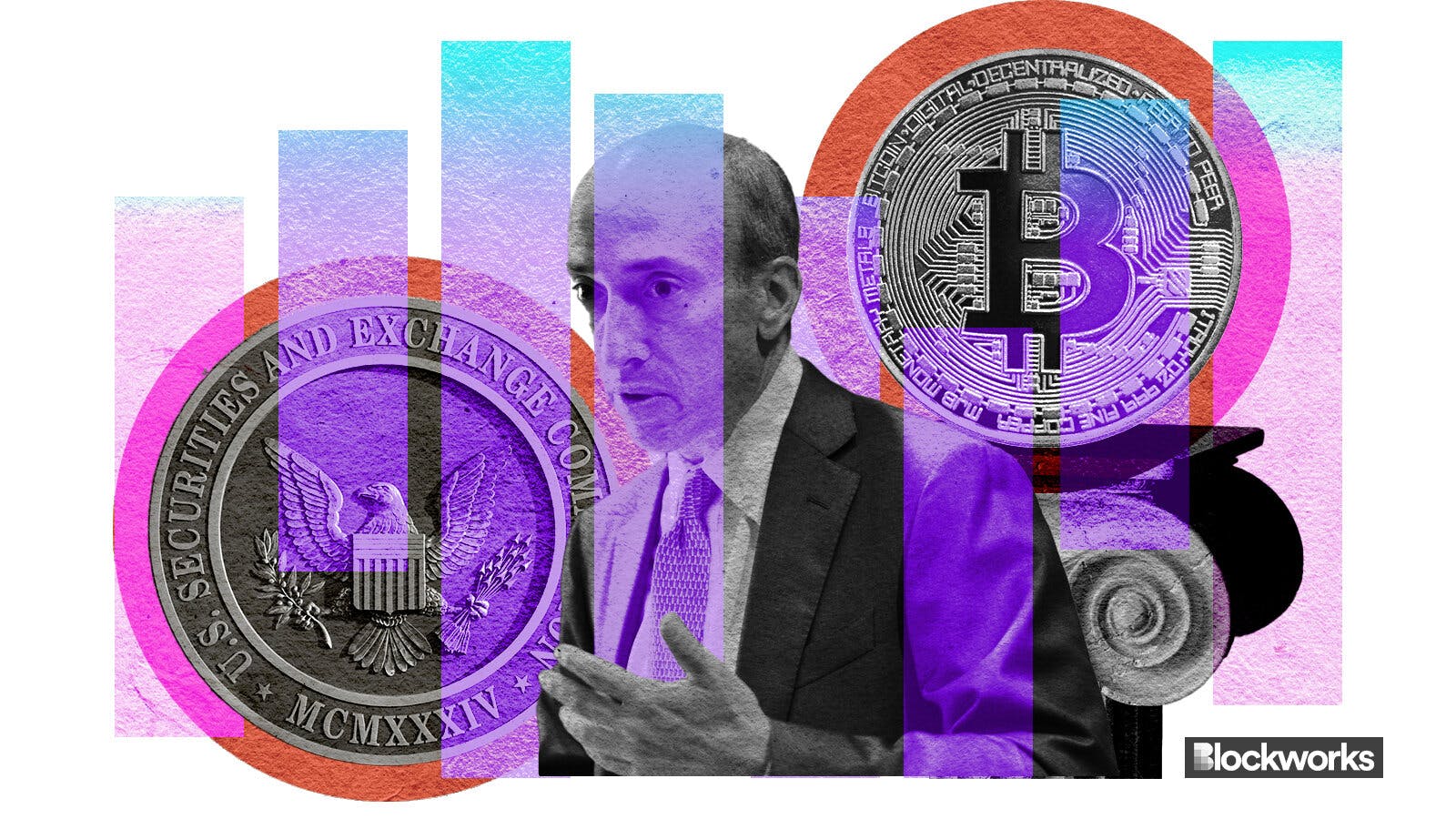Fees, seeds and APs: What we know — and don’t know — about the planned bitcoin ETFs
Fidelity has so far listed the lowest intended fund fee, while BlackRock has not yet made known its proposed expense ratio

Artwork by Crystal Le
Fund issuers have been submitting amendments to their spot bitcoin ETF applications for weeks, revealing key details to the US Securities and Exchange Commission and the investing public.
The latest flurry of updates was on Dec. 29, and a Grayscale Investments amendment came through on Tuesday — just days ahead of a potential SEC decision.
More amendments are expected in the coming days, but here’s what the documents are telling us — and not telling us — so far.
Some authorized participants revealed
Asset management goliath BlackRock listed Jane Street and JPMorgan Securities as its authorized participants in a Dec. 29 filing. Fidelity tapped the same entities for that role.
Authorized participants, or APs, are entities permitted to create and redeem shares of an ETF. Fund shares can typically be exchanged for a basket of securities reflecting the holdings of the ETF, or for cash.
Agreements with APs is one of the final steps the SEC is looking for, Eric Balchunas previously told Blockworks. The SEC has declined to comment on this matter.
The regulator is expected to rule on a handful of spot bitcoin ETFs by Jan. 10 — the deadline by which its decision on a proposal by Ark Invest and 21Shares is due.
Read more: Industry watchers pin down possible bitcoin ETF approval dates
Others to reveal its authorized participants before the new year were Invesco, WisdomTree and Valkyrie.
Invesco intends to use JPMorgan Securities and Virtu Americas. WisdomTree and Valkyrie both plan to work with Jane Street, with Valkyrie also slated to enlist Cantor Fitzgerald.
Franklin Templeton did not name an authorized participant in a Dec. 29 filing, noting a list of such entities “can be obtained from the administrator or the sponsor.”
A spokesperson for the company did not immediately return a request for comment.
An application amendment from Grayscale Investments came through Tuesday, though did not name an authorized participant for its proposed bitcoin ETF. The company, however, had previously confirmed reports that it had lined up Jane Street and Virtu Financial as APs should its Bitcoin Trust (GBTC) be converted to an ETF.
Meanwhile, Bitwise and VanEck, as well as Ark Invest and 21Shares, did not name authorized participants in their latest amended filings last week. Global X, Pando Asset Management and Hashdex did not file such updates at that time.
Hashdex’s last amendment came on Dec. 22, when it named many “authorized purchasers” for the fund: JP Morgan Securities; Goldman Sachs, ABN AMRO Bank; BNP Paribas; BNY Mellon; Cantor Fitzgerald, Credit Suisse; Citadel Securities; Jefferies Group; Mirae Asset Financial Group; Royal Bank of Canada; UBS; Societe Generale; Wells Fargo; and Virtu Americas.
A Global X spokesperson declined to comment, and a representative for Pando Asset Management could not immediately be reached.
Where fund fees stand
Sponsor fees cover the expenses of running a fund and represent a portion of the expense ratio. It’s another closely watched line item as the SEC continues to mull the 14 proposals.
In a slew of filings last week, some of the potential ETFs unveiled their fees for the first time.
So far, Fidelity has the lowest at 39 basis points, though others are looking to stay competitive in other ways.
Invesco, which filed its bitcoin ETF proposal with Galaxy Digital, plans to charge a 0.59% fee. The company said it plans to waive the fee on the first $5 billion of trust assets in the first six months of trading.
Read more: As potential crypto ETF ‘fee war’ looms, what will spot bitcoin ETFs cost?
Ark, back in November, first disclosed a sponsor fee of 80 basis points. Valkyrie also plans to charge a 0.80% fee.
Proposals from Franklin Templeton, WisdomTree, BitWise, VanEck and BlackRock have yet to disclose fees in the most recent round of S-1 amendments.
Nate Geraci, president of The ETF Store, said BlackRock is the “big one” when it comes to fees. He previously said on X that he believes BlackRock could come in lower than Fidelity, and that it’s going to be hard for ETFs to stay competitive with fees above 80 bps.
Issuers that did not file amendments last week — including Hashdex, Global X and Pando Asset Management — did not disclose fees.
The Hashdex Bitcoin Futures ETF (DEFI) — a fund the firm is seeking approval to hold bitcoin directly — carries an expense ratio of 94 basis points.
Some firms update seed capital
Bitwise, on Dec. 29, disclosed that an unknown buyer plans to purchase up to $200 million shares to seed the fund.
Seed capital is used to fund the ETF’s creation units so its shares can be offered and traded.
The amount blows away BlackRock’s previous seeding announcement of $10 million, which led Bloomberg Intelligence analyst James Seyffart to believe that BlackRock could be expecting to launch “shortly after” a possible January decision. The firm had previously disclosed a $100,000 seed sale.
VanEck noted a smaller seed share purchase of $100,000 but also — in brackets — included a potential sale of $25 million.
Invesco’s filing shows a potential purchase of $5 million in shares “on or about” Jan. 2, though a $100,000 sale was made in December. WisdomTree disclosed a potential sale of $2.5 million in January. The sum includes a $50,000 sale made in December.
On Dec. 15, Franklin Templeton disclosed a $100,000 seed sale. Meanwhile, Ark’s most recent amendments to its S-1 unveiled a $100 seed purchase.
Grayscale, Fidelity and Valkyrie didn’t disclose seeding in their most recent S-1 amendments.
Get the news in your inbox. Explore Blockworks newsletters:
- The Breakdown: Decoding crypto and the markets. Daily.
- 0xResearch: Alpha in your inbox. Think like an analyst.






